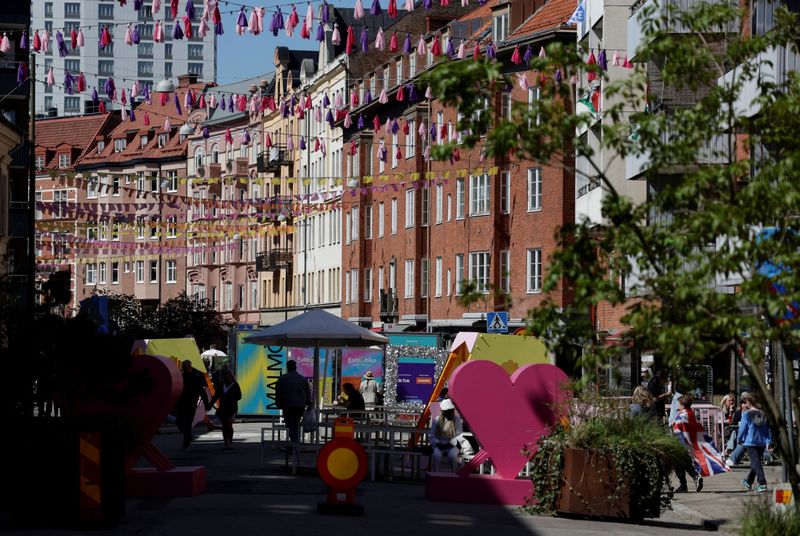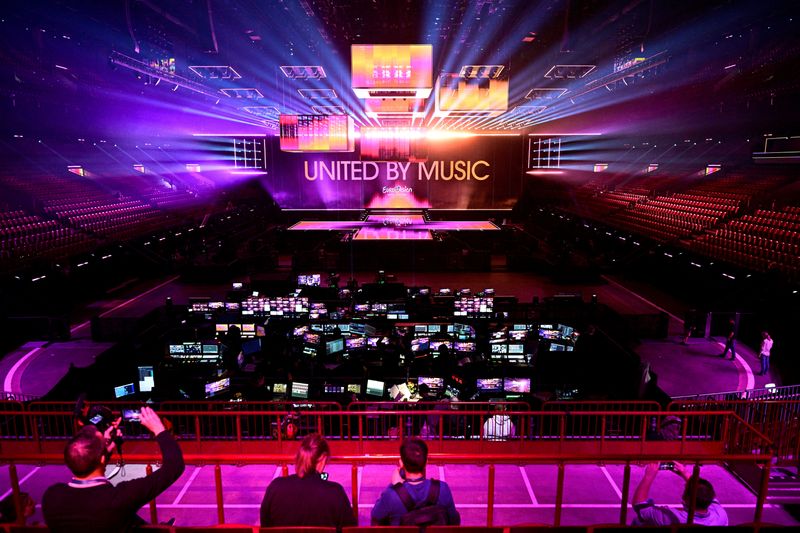MALMO, Sweden (Reuters) -The world's biggest live music event, the Eurovision Song Contest, is taking place in Sweden this week with 37 participating countries.
Roughly 100,000 visitors from 89 countries are expected in host city Malmo during the week for the 68th edition of the competition, along with large protests against Israel's participation due to the war in Gaza.
WHEN IS THE EUROVISION SONG CONTEST 2024?
The event kicked off on Tuesday with the first semi-final, and will be followed by a second semi-final on Thursday.
The Grand Final will be held on Saturday, May 11 at 1900 GMT.
WHERE IS EUROVISION BEING HELD?
The Eurovision Song Contest 2024 is taking place in Malmo, Sweden's third-largest city with a population of 362,000. The city also hosted Eurovision in 1992 and in 2013.
Sweden has hosted Eurovision seven times in total, counting 2024. Stockholm, the capital, hosted the competition in 1975, 2000 and 2016 and Gothenburg in 1985.
The concert venue is the Malmo Arena, which has a capacity of up to 15,500.
WHAT DEMONSTRATIONS ARE EXPECTED?
Several protests are planned in central Malmo this week after organizer European Broadcasting Union (EBU) resisted calls to exclude Israel over its devastating military campaign in Gaza, triggered by Hamas' Oct. 7 attack on Israel.
Protests against Israel's participation which are expected to draw tens of thousands of people are scheduled for 1300 GMT on Thursday and Saturday. Pro-Israel supporters have planned a protest for Thursday at 1600 GMT.
A vessel from Swedish NGO 'Ship to Gaza' is scheduled to arrive in Malmo harbour on Wednesday, with a call for solidarity with the people of Gaza.
WHO IS ISRAEL'S EUROVISION CONTESTANT?
Eden Golan, 20, will represent Israel at this year's Eurovision with the song "Hurricane".
Israel was allowed to compete after agreeing to modify the lyrics of its original song "October Rain", which appeared to reference the Oct. 7 Hamas onslaught in Israel.
Golan says she hopes her performance will help unite people.
"It's a super important moment for us, especially this year," she told Reuters in an interview this week. "I feel honoured to have the opportunity to be the voice of my country."
Israel has previously won Eurovision four times, in 1978, 1979, 1998 and 2018.
WHAT SECURITY MEASURES HAVE BEEN TAKEN?
Swedish police said security will be higher than in 2013 when Malmo last hosted the Eurovision. It has been reinforced by officers from neighbouring Denmark and Norway.
Authorities have said the threat level for terrorist or cyber attacks is high.
Visitors will have to pass through metal detectors before entering Malmo arena, and will not be allowed to bring bags into the venue.
Only the national flags of the participating countries and the Pride flag are allowed inside the venue, while flags, symbols, clothing, items and banners likely to be to used promote other causes during the TV broadcast will be removed.
HOW DOES VOTING WORK?
The results of the two semi-finals are decided by viewers, who can vote up to 20 times, either by phone, text message or the Eurovision app.
Viewers in the 15 countries taking part in Semi-Final 1 were eligible to vote alongside three of the countries pre-qualified for the Grand Final - Germany, Sweden and the United Kingdom.
Those in the 16 countries taking part in Semi-Final 2 are eligible to vote alongside three of the other countries pre-qualified for the Grand Final – France, Italy and Spain.
In the final, audience votes will make up half of the result, while juries of five music professionals in each participating country will make up the other half.
The juries will rank the songs based on composition and originality of the song, quality of the stage performance, the artists' vocal capacity, and their overall impression of the act.
Each country will award points from 1 to 8, 10 and 12.
Non-participating countries around the world will also be able to vote, and will collectively have the weight of one additional voting country.
New to this year's Eurovision, viewers outside the participating countries can vote 24 hours prior to each semi-final and the Grand Final.
WHO SECURED A SPOT IN THE GRAND FINAL FOLLOWING THE FIRST SEMI-FINAL?
Croatia, Cyprus, Finland, Ireland, Lithuania, Luxembourg, Portugal, Serbia, Slovenia and Ukraine.
Australia, Azerbaijan, Iceland, Moldova, and Poland did not make it through to the final.
WHO WILL COMPETE IN THE SECOND SEMI-FINAL ON THURSDAY?
Malta, Albania, Greece, Switzerland, Czech Republic, Austria, Denmark, Armenia, Latvia, San Marino, Georgia, Belgium, Estonia, Israel, Norway, and the Netherlands.
WHO COMPETES IN THE GRAND FINAL?
The top 10 from each semi-final will participate in the final.
Last year's winner and host nation Sweden has automatic entry to the final as well as the "Big Five" countries: United Kingdom, France, Germany, Italy and Spain.
There will be 26 acts in total in the final.
WHY THE 'BIG FIVE'?
The "Big Five" countries make the biggest financial contribution to the European Broadcasting Union (EBU).
Since 2000, these countries have secured themselves an automatic spot in the Grand Final.
HOW TO WATCH IT
The song contest will be broadcast by all 37 participating countries. It will also be streamed on YouTube.
WHO IS THE FAVOURITE TO WIN EUROVISION?
Bookmakers have Croatia, Switzerland, Italy, Ukraine and Ireland as the top five favourites to win, while streaming data from Spotify also suggests a strong chance for the Netherlands or host nation Sweden.
WHO ARE THE PRESENTERS?
The song contest will be presented by Swedish comedian and actress Petra Mede and Swedish-American actress Malin Akerman.
EUROVISION HISTORY
The Eurovision song contest is one of the world's largest television events, and has been held annually since 1956.
Eurovision features live music performances from most European countries and beyond, including Israel and Australia.
Originally it started as a technical experiment for transnational broadcast television, with only seven countries competing - the Netherlands, Switzerland, Belgium, Germany, France, Luxembourg, and Italy.
The show reached 162 million people in 2023 through public service markets.
WHICH COUNTRIES HAVE WON THE MOST EUROVISIONS?
Sweden and Ireland are leading with seven wins each. France, Luxembourg, the United Kingdom, and the Netherlands have each won five times, with the Netherlands as the most recent of the four countries to win in 2019.

WHO WON LAST YEAR?
Swedish singer Loreen won last year's competition in Liverpool for the second time with her song "Tattoo". She is the only person after Ireland's Johnny Logan to win the contest twice.
